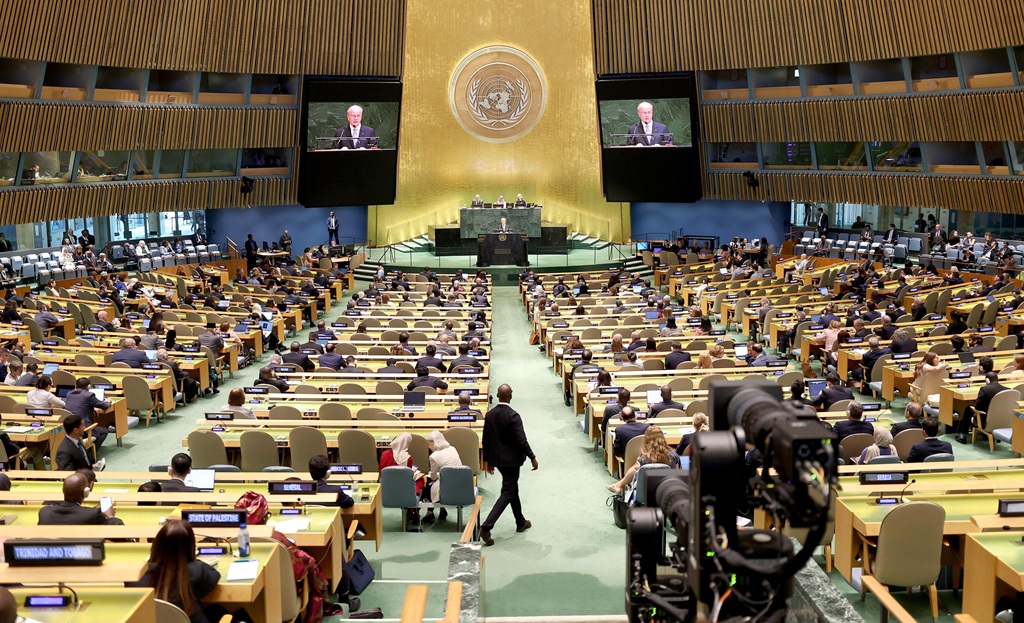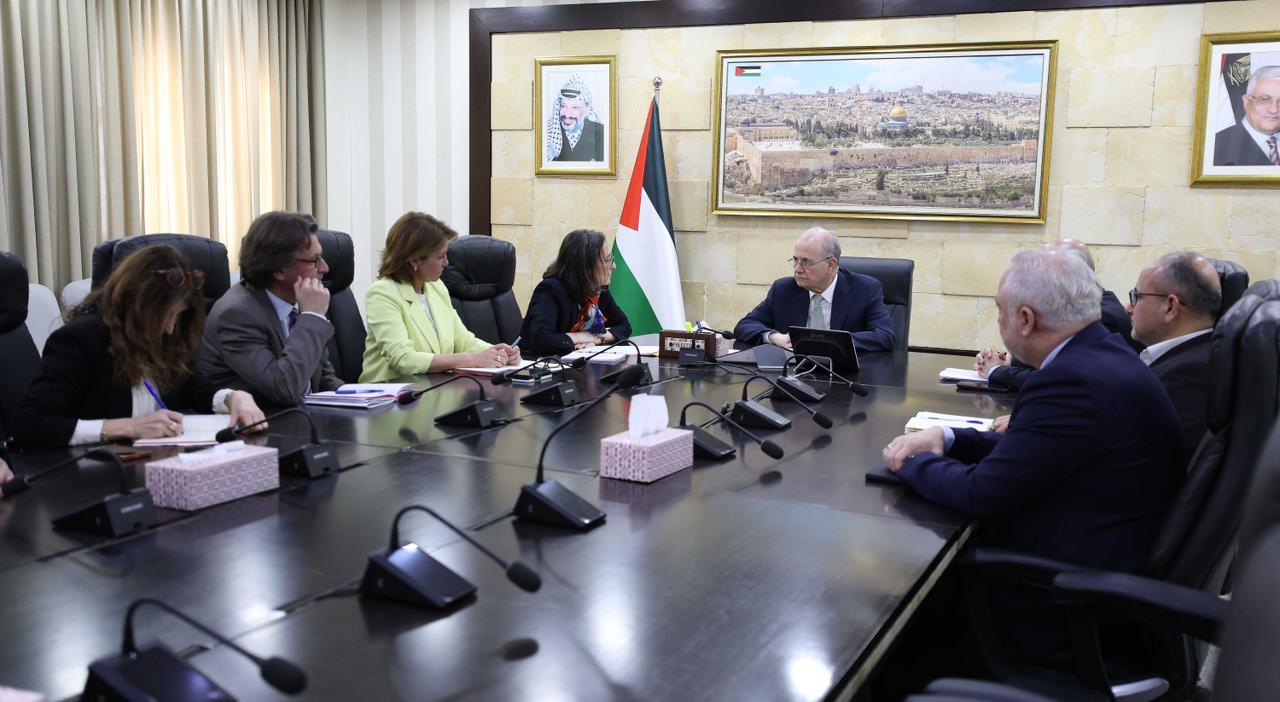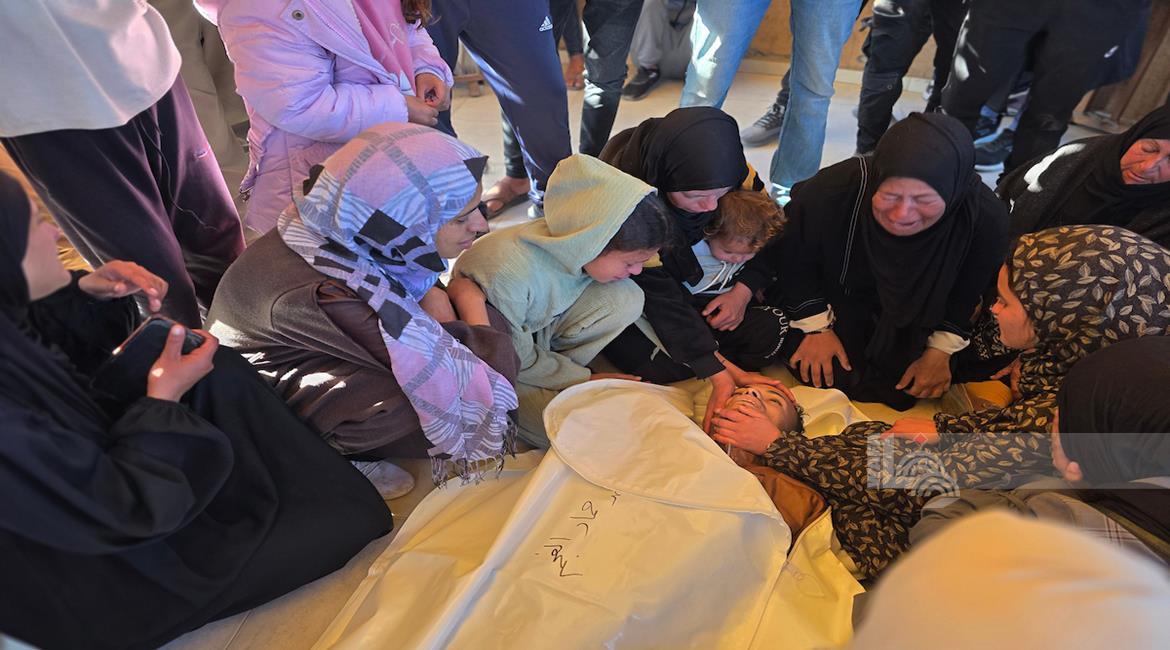NEW YORK, July 30, 2025 (WAFA) – The Two-State Solution Conference held in New York affirmed the agreement to take concrete, time-bound steps to achieve a peaceful settlement of the Palestinian issue and implement the two-state solution.
The New York Declaration, issued at the conclusion of the High-Level International Conference on the Peaceful Settlement of the Palestinian Question and the Implementation of the Two-State Solution, held in New York City under the joint chairmanship of Saudi Arabia and France, emphasized the need for collective action to end the war in Gaza, ensure Israel's withdrawal from the Gaza Strip, and hand it over to the Palestinian Authority "based on the principle of one government, one law, one gun."
It emphasized that war, occupation, and forced displacement will not achieve peace or security, and that only a political solution can achieve that. It emphasized that ending the Palestinian-Israeli conflict and implementing the two-state solution is the only way to fulfill legitimate aspirations, in accordance with international law.
The New York Declaration emphasized that Gaza is an integral part of the Palestinian state and must be unified with the West Bank, and that here must be no occupation, blockade, territorial constriction, or forced displacement.
It said that following a ceasefire, a transitional administrative committee must be established immediately to operate in Gaza under the umbrella of the Palestinian National Authority.
The New York Declaration emphasized the commitment to supporting the Palestinian government and Palestinian security forces through funding programs from regional and international partners.
It called on Israel to issue a clear and public commitment to a two-state solution, including a sovereign and viable Palestinian state, to immediately end violence and incitement against Palestinians, to cease all colonial activity, land seizure, and annexation in the occupied Palestinian territory, including East Jerusalem, to publicly abandon any annexation projects or colonial policies, and to end colonists' violence.
The declaration affirmed its commitment to mobilizing political and financial support for the Palestinian Authority to help it strengthen its institutional capacities, implement its reform program, and assume its responsibilities throughout the occupied Palestinian territories. It also called for the removal of restrictions on movement and access, the immediate release of withheld Palestinian tax revenues, and the establishment of a new framework for the transfer of clearance revenues that would lead to full Palestinian control over the tax system, as well as the full integration of Palestine into the international monetary and financial system and the guarantee of sustainable, long-term banking relations.
It called for the preservation of the legal and historical status quo at the Islamic and Christian holy sites in Jerusalem, and a commitment to adopting restrictive measures against violent extremist settlers and entities and individuals who support illegal settlements, in accordance with international law.
The New York Declaration affirmed that coexistence and normal relations between the peoples and states of the region can only be achieved through an end to the occupation and the establishment of a sovereign Palestinian state.
Following is the full text of the New York Declaration:
Joint Chair Statement of the Conference: The French Republic and the Kingdom of Saudi Arabia
"In association with the chairs of the working groups: The Federative Republic of Brazil, Canada, the Arab Republic of Egypt, the Republic of Indonesia, Ireland, the Italian Republic, Japan, the Hashemite Kingdom of Jordan, the United Mexican States, the Kingdom of Norway, the State of Qatar, the Republic of Senegal, the Kingdom of Spain, the Republic of Turkey, the United Kingdom of Great Britain and Northern Ireland, the European Union, and the League of Arab States.
1. We, the leaders and representatives, gathered at the United Nations in New York from July 28 to 30, 2025, at a critical historic moment for peace, security, and stability in the Middle East.
2. We agreed to take collective action to end the war in Gaza and to achieve a just, peaceful, and lasting resolution to the Israeli–Palestinian conflict based on the effective implementation of the two-state solution and to build a better future for Palestinians, Israelis, and all peoples of the region.
3. Recent developments have, once again and more than ever, underscored the horrific human toll and grave consequences of the ongoing conflict in the Middle East on regional and international peace and security. Without decisive steps toward a two-state solution and strong international guarantees, the conflict will deepen and regional peace will remain elusive.
4. We reiterated our condemnation of all attacks against civilians by any party, including all acts of terrorism, indiscriminate attacks, all attacks on civilian infrastructure, acts of incitement, provocation, and destruction. We recall that hostage-taking is prohibited under international law. We also affirm our rejection of any actions that result in territorial or demographic changes, including the forced displacement of Palestinian civilians, as such actions represent a grave violation of international humanitarian law. We condemn the attacks committed by Hamas against civilians on October 7, as well as the attacks carried out by Israel against civilians and civilian infrastructure in Gaza, along with the blockade and starvation that have caused a devastating humanitarian catastrophe and a protection crisis. There is no justification for grave breaches of international law, including international humanitarian law, and we stress the need for accountability.
5. War, occupation, terrorism, and forced displacement will not bring peace or security. Only a political solution can do so. Ending the Israeli–Palestinian conflict and implementing the two-state solution is the only way to meet the legitimate aspirations of both Israelis and Palestinians, in accordance with international law. It is also the best path to ending violence in all its forms, countering destabilizing roles by non-state actors, ending terrorism and violence in all its forms, ensuring the security of both peoples and the sovereignty of both states, and achieving peace, prosperity, and regional integration for the benefit of all peoples in the region.
6. We committed to taking concrete, time-bound, and irreversible steps for the peaceful resolution of the question of Palestine and the implementation of the two-state solution, in order to achieve, through practical measures and as soon as possible, an independent, sovereign, economically viable, and democratic State of Palestine, living side by side in peace and security with Israel, allowing for full regional integration and mutual recognition.
7. We agreed to support this objective, and, within a specific timeframe, to work toward concluding and implementing a just and comprehensive peace agreement between Israel and Palestine, in accordance with relevant United Nations resolutions, the terms of reference of the Madrid Conference—including the principle of land for peace—and the Arab Peace Initiative. This agreement should end the occupation, resolve all outstanding issues and final status matters, end all claims, ensure peace and security for all, and enable full regional integration and mutual recognition in the Middle East, with full respect for the sovereignty of all states.
Ending the War in Gaza and Ensuring the Day After
8. The war in Gaza must end now. We expressed our support for the efforts of Egypt, Qatar, and the United States to immediately return the parties to the implementation of the ceasefire agreement in all its phases, leading to a permanent end to hostilities, the release of all hostages, the exchange of Palestinian prisoners, the return of all remains, and the complete withdrawal of Israeli forces from Gaza. We affirmed our determination to work toward these goals. In this context, Hamas must release all hostages.
9. Crossings throughout the Gaza Strip must be opened, in coordination with the United Nations and the International Committee of the Red Cross and in accordance with humanitarian principles. This must include the immediate lifting of restrictions and the opening of border crossings by Israel, the occupying power, and the resumption of energy supplies and the entry of fuel, medical supplies, food, water, and other essential materials. We reaffirmed the necessity of protecting UN staff and humanitarian workers and enabling them to work effectively. We also stressed our rejection of the use of starvation as a method of warfare, which is prohibited under international law, and emphasized the need to act immediately to address rising famine and prevent its spread in Gaza.
10. Gaza is an integral part of the Palestinian state and must be unified with the West Bank. There must be no occupation, siege, territorial reduction, or forced displacement.
11. Governance, law enforcement, and security in all Palestinian territories must be under the sole authority of the Palestinian Authority, with appropriate international support. We welcomed the Palestinian Authority’s “One State, One Government, One Law, One Gun” policy and pledged to support its implementation, including through the necessary Disarmament, Demobilization, and Reintegration (DDR) process, to be completed within an agreed mechanism and timeline with international partners. As part of ending the war in Gaza, Hamas must end its rule in Gaza and hand over its weapons to the Palestinian Authority, with international support and participation, consistent with the goal of establishing an independent, sovereign State of Palestine.
12. We endorsed the prompt implementation of the Arab League and Organisation of Islamic Cooperation reconstruction plan to enable early recovery and reconstruction in the Gaza Strip, ensuring that Palestinians remain on their land. We encouraged all countries and regional and international partners to actively participate in the Gaza Reconstruction Conference to be held soon in Cairo.
13. After the ceasefire, an interim administrative committee must immediately be established to operate in Gaza under the umbrella of the Palestinian Authority.
14. We called on member states, the United Nations and its agencies, and international organizations to provide broad resources and assistance to support recovery and reconstruction, including through a dedicated international trust fund for this purpose. We reaffirmed the indispensable role of UNRWA and expressed our commitment to continue supporting it, including through appropriate funding, in implementing its mandate. We welcomed its ongoing efforts to implement the recommendations of the Colonna Report. Upon reaching a just solution to the Palestinian refugee issue in accordance with UN General Assembly Resolution 194, UNRWA will transfer its public services in the Palestinian territories to empowered and equipped Palestinian institutions.
15. We supported the deployment of a temporary international stabilization mission, at the invitation of the Palestinian Authority and under the UN’s umbrella and principles, based on the UN’s existing capacities, to be mandated by the Security Council with appropriate regional and international support. We welcomed the readiness of some member states to contribute forces.
16. This mission, which can evolve according to needs, will provide protection for Palestinian civilians, support the transfer of internal security responsibilities to the Palestinian Authority, offer assistance in building the capacities of the Palestinian state and its security forces, and provide security guarantees for both Palestine and Israel — including monitoring the ceasefire and any future peace agreement — while fully respecting the sovereignty of both states.
17. We committed to supporting the Palestinian government and Palestinian security forces through funding programs from regional and international partners, including appropriate training, equipping, vetting, and advisory support, drawing on the experience of missions such as the USSC, EUPOL COPPS, and EUBAM Rafah.
18. We also committed to supporting measures and programs aimed at combating extremism, incitement, dehumanization, and violent extremism leading to terrorism, as well as discrimination and hate speech across all platforms and actors. We emphasized the promotion of a culture of peace in schools in both Israel and Palestine, and supported the involvement of civil society and dialogue. We welcomed ongoing efforts to update the Palestinian curricula and called on Israel to undertake a similar effort. We also supported the establishment of an international monitoring mechanism to verify both parties’ compliance with these goals.
Empowering a Sovereign and Economically Viable State of Palestine
19. We reaffirmed our unwavering support — in accordance with international law and relevant UN resolutions — for the implementation of the two-state solution, in which two sovereign democratic states, Palestine and Israel, live side by side in peace and security within recognized and secure borders, based on the 1967 lines, including with respect to Jerusalem.
20. We welcomed the commitments made by President Mahmoud Abbas on behalf of Palestine, as stated in his letter dated 9 June 2025, including a peaceful resolution to the question of Palestine and a continued rejection of violence and terrorism. We also welcomed President Abbas’s statement that the Palestinian state must be the sole authority responsible for security within its territory, that it does not intend to be a military state, and that it is ready to work on security arrangements beneficial to all parties — with full respect for its sovereignty — as long as it is under international protection.
21. We emphasized the need for the Palestinian Authority to continue implementing its credible reform agenda, with international support — especially from the European Union and the Arab League — focusing on good governance, transparency, financial sustainability, combating incitement and hate speech, delivering public services, and improving the business environment and development.
22. We also welcomed President Abbas’s commitment to hold democratic and transparent general and presidential elections throughout the occupied Palestinian territories, including East Jerusalem, within one year under international auspices. These elections should allow for democratic competition among Palestinian parties that commit to respecting the Palestine Liberation Organization’s program, its international commitments, relevant UN resolutions, and the principle of “one state, one government, one law, one weapon.” This will allow a new generation of elected representatives to take on responsibility. Based on an invitation from the Palestinian Authority, the European Union committed to continuing its support for the electoral process.
23. We called on the Israeli leadership to make a clear and public commitment to the two-state solution — including a sovereign and viable Palestinian state — to immediately end violence and incitement against Palestinians, halt all settlement activity, land confiscation, and annexation acts in the occupied Palestinian territories, including East Jerusalem, and to publicly renounce any annexation projects or settlement policies. We also called for an end to settler violence, including by implementing UN Security Council Resolution 904 and enacting legislation to punish and deter violent settlers and their illegal actions.
24. We urged both parties to continue efforts to ensure that their political factions are committed to the principles of nonviolence, mutual recognition, and the two-state solution.
25. We reaffirmed our support for the Palestinian people’s right to self-determination. Given the absence of current negotiations between the two sides, and recognizing that illegal unilateral actions pose an existential threat to the realization of an independent Palestinian state, we stressed that recognition of and realization of the State of Palestine are essential and indispensable components of implementing the two-state solution — while noting that recognition is a sovereign decision of each state. Full UN membership for the State of Palestine is a crucial element of a political solution to end the conflict, enabling full regional integration.
26. We committed to mobilizing political and financial support for the Palestinian Authority as it implements its reforms, in order to help it strengthen its institutional capacities, carry out its reform agenda, and assume its responsibilities across all the occupied Palestinian territories. To this end, we called on more countries to pledge increased financial support — alongside the European Union and other donors — and to convene an international donors' conference as soon as possible.
27. We agreed to enhance Palestinian economic development, facilitate trade, and strengthen the competitiveness of the Palestinian private sector. We called for the removal of restrictions on movement and access, the immediate release of withheld Palestinian tax revenues, and committed to reviewing the 1994 Paris Economic Protocol and developing a new framework for the transfer of clearance revenues — one that ensures full Palestinian control over the tax system. We also supported the full integration of Palestine into the international monetary and financial system, and the establishment of sustainable, long-term banking relations.
Protecting the Two-State Solution from Unlawful Unilateral Measures
28. We emphasized that commitment to the United Nations Charter and respect for international law are fundamental pillars of peace and security in the region.
29. We committed to protecting peace efforts from any obstructive parties that seek to undermine the implementation of the two-state solution through unlawful unilateral actions and violent acts.
30. We reaffirmed our strong opposition to all illegal actions — from both sides — that undermine the viability of the two-state solution, including settlement activities. We committed to taking practical measures, in accordance with international law, relevant UN resolutions, and the advisory opinion of the International Court of Justice issued on 19 July 2024, to support the Palestinian people in realizing their right to self-determination, and to counter the illegal settlement policy in the occupied Palestinian territories, including East Jerusalem, as well as policies and threats of forced displacement and annexation.
31. We called for the preservation of the existing legal and historical status quo at the Islamic and Christian holy sites in Jerusalem. We reaffirmed the essential role of the Hashemite custodianship in this regard and expressed our support for the Jerusalem Waqf and Al-Aqsa Mosque Affairs Department, administered by Jordan.
32. We committed to adopting restrictive measures against violent extremist settlers and the entities and individuals who support illegal settlements, in accordance with international law.
33. We are committed to adopting targeted measures, in accordance with international law, against entities and individuals who act against the principle of a peaceful settlement of the Palestinian issue through violence or acts of terrorism, and in violation of international law.
Achieving Regional Integration Through Ending the Palestinian-Israeli Conflict
34. Regional integration and the establishment of an independent Palestinian state are interconnected goals. Ending the Israeli-Palestinian conflict—which lies at the heart of the Arab-Israeli conflict—is essential for achieving peace, stability, and regional integration. Coexistence and normal relations among the peoples and countries of the region will only be possible through an end to the war in Gaza, the release of all hostages, the end of the occupation, the rejection of violence and terrorism, the establishment of an independent, sovereign, and democratic Palestinian state, the end of the occupation of all Arab territories, and the provision of strong security guarantees for both Israel and Palestine.
35. We agreed to take concrete steps to enhance mutual recognition, peaceful coexistence, and cooperation among all countries of the region, linked to the irreversible implementation of the two-state solution.
36. We called on Palestinians and Israelis to resume negotiations—with international support, supervision, and guarantees—in good faith and with sincere will, to achieve mutual peace and stability.
37. We agreed to support, in parallel with concluding a peace agreement between Palestine and Israel, renewed efforts on the Syrian-Israeli and Lebanese-Israeli tracks, with the aim of achieving a comprehensive, just, and lasting peace in the Middle East, in accordance with international law and relevant United Nations resolutions, and to end all claims.
38. We have committed to preparing the groundwork for a future 'Peace Day,' based on the Arab Peace Initiative, the 'European Peace Support Package,' and other international contributions. These efforts aim to deliver tangible benefits to Palestinians, Israelis, and the region as a whole — including in areas such as trade, infrastructure, energy, and enabling regional integration — ultimately leading to the establishment of a regional security structure that promotes stability.
39. In this regard, we have decided to explore, in the context of achieving a sovereign Palestinian state, a regional security structure that could provide security guarantees for all. This structure would draw upon the experiences of the Association of Southeast Asian Nations (ASEAN) and the Organization for Security and Co-operation in Europe (OSCE), paving the way for a more stable and secure Middle East. It would also include the establishment of a regional and international framework to appropriately support the resolution of the refugee issue, with an emphasis on the right of return.
40. We are determined to ensure that the decisions made at this conference represent a turning point — mobilizing the entire international community, at political, economic, financial, and security levels — to launch a long-awaited, brighter future for all nations and peoples.
41. We have decided to assign the co-chairs of the conference and the working groups — including within the framework of the Global Coalition for the Implementation of the Two-State Solution — to serve as an international mechanism for following up on the goals and commitments of this conference. We agreed to mobilize the international community at the leadership level around these commitments on the sidelines of the 80th session of the United Nations General Assembly in September 2025.
42. This declaration and its annex reflect the outcomes of the eight working groups convened as part of the conference. These outcomes set out a comprehensive and implementable framework for a peaceful resolution to the Palestinian issue and the implementation of the two-state solution. They represent proposals covering political, security, humanitarian, economic, legal, and strategic dimensions, and constitute a practical, time-bound action plan to guide international engagement, implementation, operational coordination, and follow-up efforts toward achieving the two-state solution and full regional integration."
M.N/K.T












